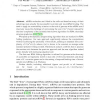Free Online Productivity Tools
i2Speak
i2Symbol
i2OCR
iTex2Img
iWeb2Print
iWeb2Shot
i2Type
iPdf2Split
iPdf2Merge
i2Bopomofo
i2Arabic
i2Style
i2Image
i2PDF
iLatex2Rtf
Sci2ools
118
click to vote
RECOMB
2006
Springer
2006
Springer
A Study of Accessible Motifs and RNA Folding Complexity
mRNA molecules are folded in the cells and therefore many of their substrings may actually be inaccessible to protein and microRNA binding. The need to apply an accessability criterion to the task of genome-wide mRNA motif discovery raises the challenge of overcoming the core O(n3 ) factor imposed by the time complexity of the currently best known algorithms for RNA secondary structure prediction [24, 25, 43]. We speed up the dynamic programming algorithms that are standard for RNA folding prediction. Our new approach significantly reduces the computations without sacrificing the optimality of the results, yielding an expected time complexity of O(n2 (n)), where (n) is shown to be constant on average under standard polymer folding models. Benchmark analysis confirms that in practice the runtime ratio between the previous approach and the new algorithm indeed grows linearly with increasing sequence size. The fast new RNA folding algorithm is utilized for genome-wide discovery of accessi...
Accessible Cis-regulatory Motifs | Computational Biology | Dynamic Programming Algorithms | RECOMB 2006 | Secondary Structure Prediction |
Related Content
| Added | 03 Dec 2009 |
| Updated | 03 Dec 2009 |
| Type | Conference |
| Year | 2006 |
| Where | RECOMB |
| Authors | Ydo Wexler, Chaya Ben-Zaken Zilberstein, Michal Ziv-Ukelson |
Comments (0)

